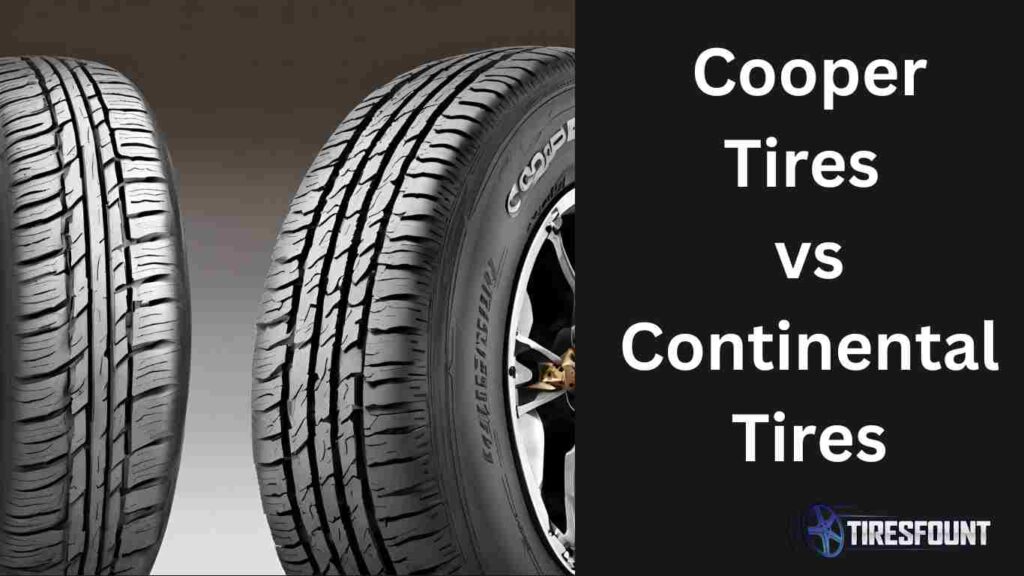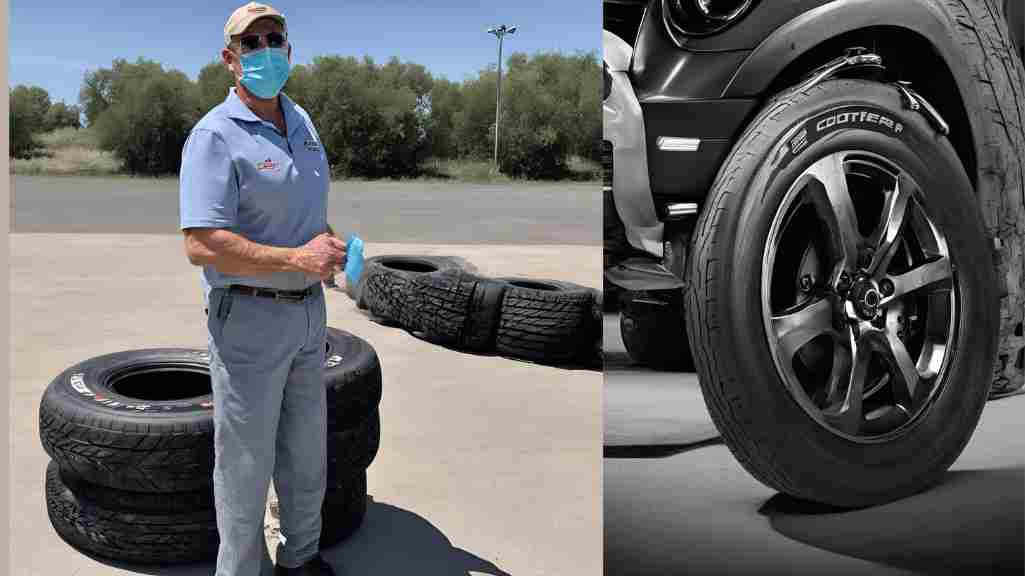Cooper Tires, founded in 1914 in Akron, Ohio, has grown into one of the largest tire manufacturers globally. Initially producing tire patches and repair kits, they expanded to manufacturing tires for various vehicles.
Continental Tires is one of the world’s leading tire manufacturers, founded in 1871 in Hanover, Germany. Originally producing rubber and soft rubber products.
But are there any big differences between Cooper Tires vs Continental? The crucial differences between Continental and Cooper Tires lie in their market positioning, technology integration, and pricing.
Continental Tires are positioned as premium products, renowned for their advanced technology and higher price point, appealing to drivers seeking top-tier performance.
On other hand, Cooper Tires offers more budget-friendly options while still providing solid performance, making them accessible to a wider range of consumers.
In this comparison guide, I’ll discuss more differences so that you can understand better.

Comparison Chart of Cooper Tires Vs Continental
The purpose of this comprehensive comparison chart is to highlight the key differences between these two renowned brands.
| Aspect | Cooper Tires | Continental Tires |
| Performance | Solid performance at an affordable price | Superior performance with premium features |
| Durability | Good durability, suitable for various driving needs | Excellent durability, longer lifespan due to advanced materials |
| Price | Affordable pricing, budget-friendly | Premium pricing, higher initial cost but potentially better long-term value |
| Technology | Utilizes innovative technologies for performance and safety | Incorporates cutting-edge features and materials for superior performance |
| Noise Reduction | Offers noise reduction features for a comfortable ride | Known for quiet operation and reduced road noise |
| Handling | Provides responsive handling and stability | Ensures precise handling and control, especially in high-performance models |
| Wet Traction | Offers reliable grip and traction in wet conditions | Excels in wet traction, with advanced tread patterns and grooves |
| Snow Traction | Provides adequate traction in snow, suitable for moderate winter conditions | Excellent snow traction, especially in dedicated winter tire models |
| Rolling Resistance | Moderate rolling resistance for decent fuel efficiency | Low rolling resistance for improved fuel economy and reduced emissions |
| Hydroplaning | Effective hydroplaning resistance for safety in wet conditions | Minimizes hydroplaning risks with advanced tread designs and technologies |
| Pros | Affordable pricing, suitable for budget-conscious consumers | Superior performance and technology, ideal for enthusiasts and drivers seeking premium features |
| Cons | May not match the premium performance of Continental tires | Higher initial cost, potentially limiting accessibility for some consumers |
| All-Terrain Tire Example | Cooper Discoverer AT3 4S | Continental TerrainContact A/T |
| Provide Warranty | Yes | Yes |
The Ultimate Guide of Cooper Tires Vs Continental

Dive into the ultimate guide comparing Cooper Tires and Continental Tires in this section.
Note: Here I give some model examples for each tire brand to clarify the idea better.
Quality
Continental Tires are often considered superior in quality due to their advanced technology and innovation, resulting in excellent performance, durability, and comfort.
They excel in handling, traction, and braking, offering a quiet and comfortable ride.
While Cooper Tires provides good quality at a more affordable price point, Continental’s premium positioning is reflected in its higher price, justified by its cutting-edge engineering and materials.
Ultimately, the choice depends on balancing performance expectations with budget constraints.
Design
Continental Tires often boast sophisticated designs, incorporating advanced technologies to optimize performance and safety.
Their tread patterns are engineered for superior traction and handling across different road conditions.
For instance, The ExtremeContact DWS06 features an innovative asymmetrical tread pattern with large outer shoulder blocks for enhanced cornering grip and stability.
Cooper Tires, while also focusing on performance-driven designs, may lean towards more traditional styles.
The Discoverer AT3 4S is designed with an aggressive, five-rib tread pattern featuring alternating shoulder blocks and deep grooves.
Dry and Wet Braking
Continental Tires, exemplified by the ExtremeContact Sport, offer exceptional dry braking through silica-enhanced compounds and precise tread patterns.
Their design ensures shorter stopping distances and a reliable grip on dry roads. In wet conditions, Continental’s innovations, such as wide grooves and advanced siping, enhance traction and minimize hydroplaning risks.
Cooper Tires, like the Zeon RS3-G1, also prioritize effective braking in both dry and wet conditions.
With optimized tread patterns and grooves, Cooper tires deliver reliable grip and stability, contributing to confident braking performance regardless of the weather, and ensuring safety for drivers.
Handling
Continental Tires, such as the ExtremeContact Sport, offer precise handling through advanced tread compounds and innovative patterns.
Solid center ribs and shoulder blocks ensure stability and responsiveness, enabling confident cornering on dry and wet roads.
In contrast, Cooper Tires, like the CS5 Ultra Touring, prioritize handling with reinforced sidewalls and optimized tread designs.
Features such as 3D siping and lateral grooves maintain grip and traction, providing balanced control across different road conditions for
Noise
Continental and Cooper strive to provide drivers with a quieter and more enjoyable driving experience by utilizing innovative technologies and tread patterns.
Continental Tires, such as the ExtremeContact DWS06, employ noise-canceling structures and variable-pitch tread blocks to reduce road noise, ensuring a quieter ride.
Cooper Tires, like the Discoverer SRX, prioritize noise reduction through advanced tread designs and materials.
These features minimize noise and vibration, enhancing overall driving comfort.
Snow Traction
Continental Tires and Cooper Tires prioritize snow traction in their designs, employing specialized tread compounds and tread patterns to provide reliable grip and stability on snowy roads.
For instance, the WinterContact SI excels in snow traction with specialized tread compounds and aggressive tread patterns.
Features such as deep sipes and wide grooves efficiently evacuate snow and slush, providing enhanced grip and stability on snowy roads.
On the other hand, the Discoverer True North also offers strong snow traction.
Their tread designs incorporate saw-toothed edges and high-density siping for reliable traction in winter conditions.
Ride Comfort
Ride comfort is paramount for a pleasant driving experience, and both Continental and Cooper Tires prioritize this aspect in their designs.
Continental Tires, with models like the TrueContact Tour, incorporate features such as optimized tread patterns and advanced rubber compounds to provide a smooth and comfortable ride.
Through sidewall construction and tread design innovations, Cooper Tires, such as the CS5 Grand Touring, ensure reduced road noise and vibrations.
Both brands strive to deliver a comfortable driving experience, enhancing overall satisfaction for drivers and passengers alike.
Rolling Resistance
Rolling resistance, influencing fuel efficiency and environmental impact, is a key consideration in tire design for both Continental and Cooper. Continental Tires, like the PureContact, utilize advanced tread compounds and low rolling resistance technology to minimize energy loss and improve fuel economy.
On the contrary, Cooper Tires, with models such as the Evolution Tour, also prioritize low rolling resistance through innovative tread designs and materials.
By reducing friction between the tire and the road surface, both brands aim to enhance fuel efficiency and decrease CO2 emissions, contributing to a more sustainable driving experience.
Hydroplaning
Continental Tires, such as the ExtremeContact DWS06, tackle hydroplaning with wide circumferential grooves and advanced siping, channeling water away to maintain traction on wet surfaces.
Similarly, Cooper Tires like the Discoverer SRX prioritize hydroplaning resistance through deep grooves and lateral channels, ensuring water evacuation for sustained road contact.
Technology
Continental and Cooper Tires incorporate advanced technologies to optimize performance and safety.
Continental’s innovations include ContiSilent for noise reduction, EcoPlus Technology for fuel efficiency, and Traction Grooves for enhanced wet traction.
Cooper employs technologies like Wear Square for tread wear indication, 3D Micro-Gauge Siping for improved grip, and StabilEdge for cornering stability.
These technologies showcase a commitment to providing drivers with tires that deliver superior performance, durability, and safety.
Costs
Continental Tires typically come with a premium price tag due to their reputation for superior performance and technology.
While the initial purchase cost may be higher, Continental tires often provide excellent long-term value through enhanced performance and durability.
In contrast, Cooper Tires offers a more budget-friendly option without compromising on quality.
Although they may not match the premium performance of Continental, Cooper tires provide solid performance and reliability at a more affordable price point, making them an appealing choice for many drivers.
Conclusion
Both Cooper and Continental offer a diverse range of tire options to cater to different needs and preferences.
Cooper Tires are often seen as a solid choice for consumers seeking good performance at a reasonable price point, while Continental Tires are favored by those who prioritize top-tier performance and are willing to invest in premium quality.
Ultimately, the best choice depends on factors such as driving habits, vehicle type, budget, and specific performance requirements.
Check out our other Tires Comparison with Cooper Tires.
